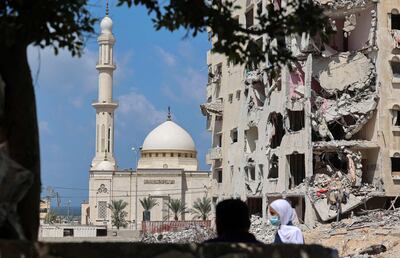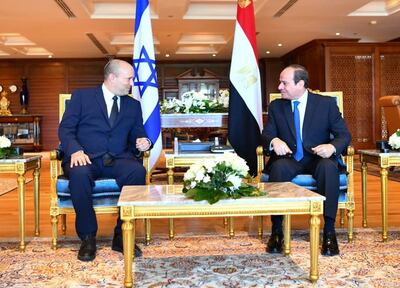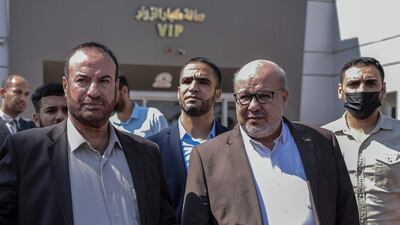Hamas leaders are in Cairo this week to finalise a prisoner exchange deal with Israel that is being mediated by Egypt, security officials said on Monday.
The Egyptian officials said the Hamas figures came to Egypt from the Gaza Strip and Qatar, where the group's "historical" leader, Ismail Haniyeh, and other senior personnel live. The Gaza delegates are led by Hamas chief, Yahya Sinwar.
According to Israeli media reports, Hamas is holding two Israeli civilians – Avner Mengistu and Hisham Al Sayed. It also has the bodies of two Israeli soldiers – Oron Shaul and Hadar Goldin – who were killed in the 2014 war between the sides.
Hamas wants Israel to release more than 1,100 prisoners in exchange.
The Palestinian group’s leadership was scheduled to meet later on Monday before talks begin with officials from Egypt’s top spy agency, the General Directorate of Intelligence. Those talks will focus on finalising the prisoner swap and plans for the reconstruction of Gaza, according to the officials.
Gaza businessmen will join parts of the reconstruction discussions, they said.

Israel does not directly negotiate with Hamas, which it considers a terrorist organisation.
Officials from Egypt's intelligence agency have routinely taken the lead in contacts with Israel and the Palestinians, a reflection of Cairo’s perception of the conflict between the two as a matter of national security.
Egypt, which shares borders with Gaza and Israel, has for years mediated between Hamas and Israel.
Cairo negotiated a truce in May that ended an 11-day war between the two in which at least 250 Palestinians were killed in hundreds of Israeli air strikes on Gaza. Rockets fired by Gaza militants killed 13 people in Israel.

Since this diplomatic success, Egypt has been emboldened to do more to pave the way for a resumption of the Palestinian-Israeli negotiations that collapsed seven years ago.
Egypt’s latest bid to reconcile Hamas and the Fatah-dominated Palestinian Authority in June failed to produce any results. The sides have been at odds since the militant group seized Gaza from the PA in 2007.
The PA exercises limited self-rule in the West Bank, while Hamas has ruled Gaza for 14 years.
Israel insists on securing the prisoner exchange before it can allow reconstruction in Gaza to proceed.
Egypt is hoping to lead this reconstruction effort and has already set aside $500 million for it. It was Egyptian equipment that removed the debris from hundreds of damaged buildings in the enclave shortly after last spring's war ended.
Looking ahead, the Egyptian officials said Cairo would like to see a high-profile, international summit convened in which regional and international players would discuss ways to breathe life into the stalled Middle East peace process.
Egypt, alongside the US, has traditionally played a mediation role in the Arab-Israeli conflict. This role has been made possible, and credible, by its own US-sponsored 1979 peace treaty with the Israelis, its common borders with Gaza and Israel and close ties with Palestinian leaders.

In recent weeks, President Abdel Fattah El Sisi held talks in Cairo with Palestinian President Mahmoud Abbas and Jordan's King Abdullah II. Last month, he met Israeli Prime Minister Naftali Bennett in the Red Sea resort city of Sharm El Sheikh.
It was the first public meeting between an Egyptian president and an Israeli prime minister in a decade. It took place at a time when relations between the two countries are experiencing a marked improvement.
Last month, Israel lifted its daily cap of 1,200 citizens allowed to enter Egypt's Sinai Peninsula through the Taba crossing on the northern tip of the Gulf of Aqaba. Sinai's Red Sea resorts attract thousands of Israelis each year.
On Sunday, a plane belonging to Egypt's national airline, EgyptAir, made a maiden flight to Israel's Ben Gurion Airport 42 years after the two countries signed their peace treaty.
The Egyptian government had used Air Sinai, a subsidiary of EgyptAir, to fly unmarked aircraft between Cairo and Ben Gurion Airport on the outskirts of Tel Aviv since the early 1980s.


